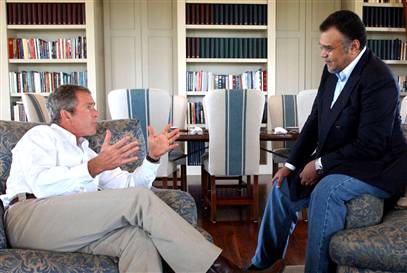Mike Isikoff at Newsweek has more on the mystery of what Prince Bandar was doing with all those millions of dollars in cash he didn’t want Riggs Bank to fill out currency forms about. (Who does Bandar think he is: Rush Limbaugh?)
The funniest line in the Newsweek story — though Isikoff doesn’t seem to get the joke — is from a Saudi embassy spokesman, pointing out (in Isikoff’s words ) than “an earlier FBI probe into embassy funds that were moved to alleged associates of the 9/11 hijackers has not led to any charges.” Duhhhhhhhh…. can you say “diplomatic immunity?” I was sure you could. People at Riggs bank might face charges; all the Saudis risk is being declared “persona non grata“: i.e., booted out of the country.
Newsweek also runs a picture that may be the answer to a question Glenn Reynolds has been asking: Is there a Saudi “mole” in Washington with access to top-secret information and the capacity to deflect attention from the Saudi/terrorist link, and, if so, who could it be?

Please, Your Highness, haven’t I always been faithful?